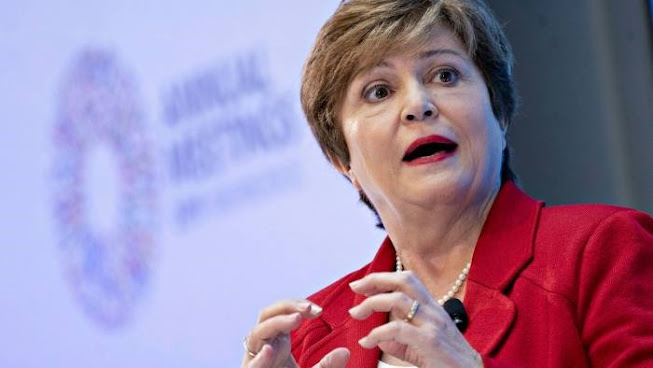Georgieva data scandal heightens IMF identity crisis
Two major shareholders are at loggerheads, it barely serves as lender of last resort and now its credibility is in jeopardy
Jonathan Wheatley
 Kristalina Georgieva has denied allegations she directed efforts to boost China’s ranking in a World Bank report © Andrew Harrer/Bloomberg
Kristalina Georgieva has denied allegations she directed efforts to boost China’s ranking in a World Bank report © Andrew Harrer/BloombergThe IMF has an identity crisis. Its traditional role as lender of last resort has been usurped by the central banks that have pumped trillions into financial markets.
Two of its biggest shareholders — the US and China — are at loggerheads.
And the fund’s reputation for scrupulous data is jeopardised by a scandal that has engulfed its managing director, Kristalina Georgieva, from when she previously headed the World Bank.
In fact, the fund may never be the same again.
For most rich and middle-income countries, the IMF had already long lost its importance — thanks, in part, to the quantitative easing programmes in place since the 2008 financial crisis.
Why sign up to IMF loans with stiff conditions when investors starved of yield are eager to lend just as much, almost as cheaply, with no strings attached?
As one senior IMF insider puts it: “Central banks have put us out of business.”
Covid-19 money-printing only accelerated this trend. During the pandemic, the IMF delivered emergency assistance to 100 countries.
While the aid was effective, it was for minor amounts as all the recipients ranked among the world’s smallest and poorest economies.
Still, a more developmental role for the IMF may well suit Georgieva’s skill set.
As the World Bank’s former chief executive, she is regarded as a progressive economist compared with some of her more hair-shirted predecessors at the fund.
“Spend all you can and keep the receipts,” has been her pandemic mantra.
But this represents a major change from the IMF’s usual role of providing emergency liquidity support.
Illustrating the change was the creation last month of $650bn of special drawing rights.
The fund distributed these SDRs, a quasi-currency, to all its members as free money, for whatever purpose they saw fit.
For some, the pandemic demanded such a response.
For others, rules were bent to distribute a fiscal boost by the back door — including to unsavoury authoritarians such as Alexander Lukashenko, president of Belarus.
The SDR programme also marked an end, critics say, to the IMF’s usual country programmes, worked out within a careful framework that includes a path to recovery, detailed debt analyses and other aspects of public policy.
Disbursements to Ukraine under a $5bn IMF programme, for example, have been repeatedly delayed by its failure to address corruption.
Instead, there is now risk of a dangerous spending free-for-all.
As World Bank chief economist Carmen Reinhart has said of some of the IMF’s latest loan recipients: “In some cases, the evidence will be overwhelming that this is not a liquidity problem but a solvency issue.”
Into the middle of this identity crisis has now landed a scandal that threatens to destroy one of the fund’s most valuable remaining assets: credibility.
According to an independent probe, while World Bank chief executive, Georgieva allegedly directed efforts to artificially boost China’s ranking in the lender’s influential annual Doing Business report.
Worse, she was seeking to raise capital for the bank from China and others at the time.
The IMF board is conducting an inquiry.
Meanwhile, staff say the scandal has jeopardised the IMF’s ability to speak truth to power.
If Georgieva manipulated data at China’s behest at the World Bank, might not the IMF under her stewardship now bend to other governments too?
In the end, it may be neither allegedly dodgy data nor the IMF’s change of direction that determines her fate.
If Georgieva goes, it probably will be because she got on the wrong side of the battle between the US and China, the fund’s biggest and third-biggest shareholders respectively.
It is significant that, last week, both US Democrats and Republicans on the House financial services committee cited the World Bank probe and questioned her suitability to lead the IMF.
Georgieva has denied the allegations and has come out fighting.
Still, whoever finally emerges victorious from this increasingly unedifying affair, it is unlikely to be the IMF.
0 comments:
Publicar un comentario